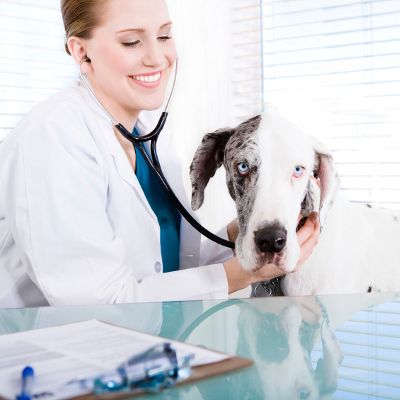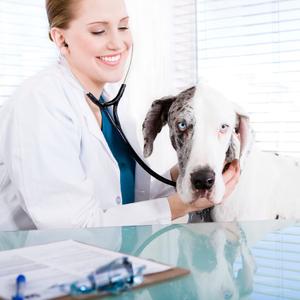Your pet can't talk, but your vet can. As a practicing emergency medicine specialist with 15 years of experience, there are a few things I wish I could've said to every pet owner I've ever met - and those that I haven't. This is the inside information that would make for smoother vet visits, healthier pets, happier pet owners, and a better time for everyone at the vet hospital (me included).
Even Free Pets Cost Money
The financial aspect of veterinary medicine can be very frustrating for both pet owners and veterinarians. The fact of the matter is that having a pet costs money - sometimes big money. Healthy pets need preventive care such as spaying and neutering, vaccines, and flea, tick, and heartworm prevention.
 In addition to preventive care, most pets will require additional trips to the veterinarian for accidents or illness at some point during their lifetime. Some pets develop chronic diseases such as diabetes or thyroid dysfunction that require life-long medications and monitoring. A healthy dog or cat can cost $6,000-9,000 over its lifetime, even without any major illness. Accidents or illness can add thousands of dollars at one time, for example, if your dog is hit by a car and breaks a leg, requiring orthopedic surgery. It can cost thousands of dollars over time in the case of chronic illness, including a diabetic cat requiring insulin and glucose monitoring, or chemotherapy for cancer. It's important to understand this and plan for it before you adopt an animal.
In addition to preventive care, most pets will require additional trips to the veterinarian for accidents or illness at some point during their lifetime. Some pets develop chronic diseases such as diabetes or thyroid dysfunction that require life-long medications and monitoring. A healthy dog or cat can cost $6,000-9,000 over its lifetime, even without any major illness. Accidents or illness can add thousands of dollars at one time, for example, if your dog is hit by a car and breaks a leg, requiring orthopedic surgery. It can cost thousands of dollars over time in the case of chronic illness, including a diabetic cat requiring insulin and glucose monitoring, or chemotherapy for cancer. It's important to understand this and plan for it before you adopt an animal.
There are low-cost options for some preventive care like vaccines, but there are few financial options for emergency situations or chronic illness. Some veterinary hospitals offer a medical credit card for people who can get approved, but few veterinary clinics offer payment plans. This isn't because they're cold-hearted or don't want to help your pet, but rather because there are too many people who abuse such systems. Ultimately, your pet is your responsibility. To avoid getting in a financial bind, decide how you'll finance veterinary care before you adopt a pet.
Pet Insurance Is a Good Idea
 Pet insurance is a growing business and there are numerous pet insurance companies available. The percentage of pet owners who have pet insurance in the United States is still low compared to some countries, but the numbers are rising. People who have pet insurance tend to worry less about the financial burden that a sudden accident or chronic illness brings. In my experience, people with pet insurance are able to do more for their pets and they are able to make decisions based more on the well-being of the pet and less on the money.
Pet insurance is a growing business and there are numerous pet insurance companies available. The percentage of pet owners who have pet insurance in the United States is still low compared to some countries, but the numbers are rising. People who have pet insurance tend to worry less about the financial burden that a sudden accident or chronic illness brings. In my experience, people with pet insurance are able to do more for their pets and they are able to make decisions based more on the well-being of the pet and less on the money.
Pet insurance doesn't dictate what veterinarians can or cannot do for the pets. Typically the bills are still paid for by the pet owner at the initial visit, and then the insurance company reimburses a percentage of the money. There are different insurance policies available depending on your budget and your needs. Pre-existing illnesses are often not covered, so it makes sense to get pet insurance when your pet is still young and healthy.
Some Medical Cases Require Lots of Tests, and We Don't Always Find an Answer
 Medicine isn't a perfect science, and veterinary medicine can be especially challenging because our patients can't tell us what's wrong. Many diseases have the same symptoms - things like loss of appetite, lethargy, fever or vomiting. It often takes a set of diagnostic tests to figure out what's causing the symptoms. Your veterinarian might start with some basic testing such as a blood count and chemistry profile to look at general organ function and x-rays of the chest and/or abdomen to look for abnormalities like organ enlargement, masses, or obstruction.
Medicine isn't a perfect science, and veterinary medicine can be especially challenging because our patients can't tell us what's wrong. Many diseases have the same symptoms - things like loss of appetite, lethargy, fever or vomiting. It often takes a set of diagnostic tests to figure out what's causing the symptoms. Your veterinarian might start with some basic testing such as a blood count and chemistry profile to look at general organ function and x-rays of the chest and/or abdomen to look for abnormalities like organ enlargement, masses, or obstruction.
If the first tier of testing does not provide an answer, additional testing is often recommended. Your veterinarian will try to pick the test that will provide the most information, but in many cases, multiple diagnostic tests are necessary. In some cases, repeat testing might be required to see what has changed, and sometimes we never make an exact diagnosis despite our best efforts. We then focus on treating the symptoms and hope that the patient's own body can heal the condition. Spoiler alert: the same thing happens in human medicine.
Veterinary Specialists Exist and Can Help Your Pet
Veterinary medicine has evolved a lot over time. In the past, one veterinarian took care of pets in the house and animals on the farm. Eventually veterinary medicine became divided more, with most veterinarians choosing to treat either small or large animals.
Now there are numerous different specialties within veterinary medicine. Veterinarians who choose to specialize beyond general practice are required to do additional training after their 4-year undergraduate degree and 4 years of veterinary school. Most specialists are required to do a 1 year internship followed by three years of residency training.
 There are a number of different specialties available. Some examples include internal medicine, surgery, emergency and critical care, radiology, cardiology, ophthalmology, oncology and dermatology. If your veterinarian feels that your pet needs specialized care, they will refer you to a specialty center in your area. Most referral centers have the ability to perform advanced diagnostics such as ultrasound, endoscopy, CT scans, or MRIs. Advanced treatments such as specialized surgeries, chemotherapy and radiation therapy might also be offered.
There are a number of different specialties available. Some examples include internal medicine, surgery, emergency and critical care, radiology, cardiology, ophthalmology, oncology and dermatology. If your veterinarian feels that your pet needs specialized care, they will refer you to a specialty center in your area. Most referral centers have the ability to perform advanced diagnostics such as ultrasound, endoscopy, CT scans, or MRIs. Advanced treatments such as specialized surgeries, chemotherapy and radiation therapy might also be offered.
As a pet owner, you'll need to decide what level of diagnostic and treatment care you are willing or able to pursue for your pet. Advanced treatment offers amazing opportunities for pet owners to treat their pets that are critically ill, have chronic illnesses needing specialty care, or have diseases that require specific treatments such as chemotherapy for cancer.
Advanced testing and treatment isn't for everyone, however. It can be expensive, time consuming, emotionally draining and may or may not be in the best interest of your pet. Ask your veterinarian for a referral if you are interested in talking to a specialist. If you would like more information on veterinary specialists, you can find it on the American Veterinary Medical Association website.
Dr. Google Isn't Always Right
 It's important to be an involved, informed, and educated pet owner, and the internet can be a great resource when you need information. Keep in mind, though, that not all websites are created equal, and not all information online is reliable. Some information is based on one person's experience or opinion and may not be widely accepted or may not relate to your pet's problem. Remember that many diseases in pets have similar symptoms, so although you may find information that says vomiting and loss of appetite might be caused by liver disease in your online search, your pet may have the exact same symptoms from swallowing a ball that's causing a blockage of the intestines.
It's important to be an involved, informed, and educated pet owner, and the internet can be a great resource when you need information. Keep in mind, though, that not all websites are created equal, and not all information online is reliable. Some information is based on one person's experience or opinion and may not be widely accepted or may not relate to your pet's problem. Remember that many diseases in pets have similar symptoms, so although you may find information that says vomiting and loss of appetite might be caused by liver disease in your online search, your pet may have the exact same symptoms from swallowing a ball that's causing a blockage of the intestines.
It's reasonable to discuss your internet search findings with your veterinarian, but be open-minded if your veterinarian suggests an alternative thought process or plan. Your veterinarian has the training and experience to know which diseases and drug side-effects are most common and should be pursued first. If you're not comfortable with your veterinarian's response to your inquiries or their plan for your pet, it's reasonable to seek a second opinion. If the second opinion agrees with the first, give some consideration to the possibility that Dr. Google might be leading you astray.
Communication with your vet is vitally important - so is trust. If you have a good vet, maybe you've already heard some of this and taken it to heart. If not, I hope this you and your pet work together with your vet for the best outcome possible.








